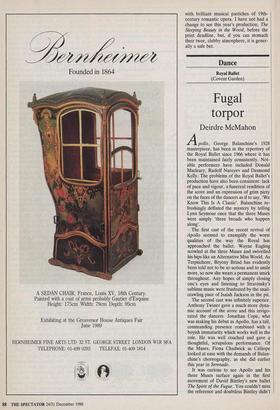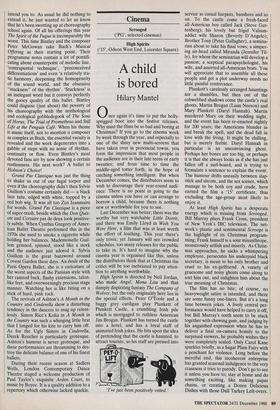Dance
Fugal torpor
Deirdre McMahon
Apollo, George Balanchine's 1928 masterpiece, has been in the repertory of the Royal Ballet since 1966 where it has been maintained fairly consistently. Not- able performers have included Donald Macleary, Rudolf Nureyev and Desmond Kelly. The problems of the Royal Ballet's production have also been consistent: lack of pace and vigour, a-fimereal rendition of the score and an expression of grim piety on the faces of the dancers as if to say, 'We Know This Is A Classic'. Balanchine re- freshingly deflated the mystery by telling Lynn Seymour once that the three Muses were simply 'three broads who happen along'.
The first cast of the recent revival of Apollo seemed to exemplify the worst qualities of the way the Royal has approached the ballet. Wayne Eagling scowled at the three Muses and swivelled his hips like an Alternative Miss World. As Terpsichore, Bryony Brind has evidently been told not to be so serious and to smile more, so now she wears a permanent smirk throughout. Any hopes of simply closing one's eyes and listening to Stravinsky's sublime music were frustrated by the snail- crawling pace of Isaiah Jackson in the pit.
The second cast was infinitely superior. Anthony Twiner gave a much more dyna- mic account of the score and this invigo- rated the dancers. Jonathan Cope, who was making his debut as Apollo, has a tall, commanding presence combined with a boyish immaturity which works well in the role. He was well coached and gave a thoughtful, scrupulous performance. Of the Muses, Fiona Chadwick as Calliope looked at ease with the demands of Balan- chine's choreography, as she did earlier this year in Serenade.
It was curious to see Apollo and his three Muses surface again in the first movement of David Bintley's new ballet The Spirit of the Fugue. You couldn't miss the reference and doubtless Bintley didn't intend you to. As usual he did nothing to extend it, he just wanted to let us know that he's been swotting up at choreography school again. Of all his offerings this year The Spirit of the Fugue is incomparably the worst. This time Bintley and the composer Peter McGowan take Bach's Musical Offering as their starting point. Their programme notes contain a lot of pontifi- cating about counterpoint of melodic line, 'contrapuntal technique', 'preconceived differentiations' and even 'a relatively sta- tic harmony, deepening the homogeneity of the sound world, and the obsessive "stuckness" of the rhythm'. `Stuckness' is an inelegant word but it conveys perfectly the gooey quality of this ballet. Bintley could disguise (just about) the poverty of his choreography with the mythological and ecological gobbledegook of The Sons of Horus, The Trial of Prometheus and Still Life at the Penguin Cafe. When his theme is music itself, not to mention a composer as complex as Bach, the essential vacuity is revealed and the work degenerates into a gabble of steps with no sense of rhythm, continuity or flow. Even Bintley's most devoted fans are by now showing a certain restlessness. His next work? A ballet to Hobson's Choice!
Grand Pas Classique was just the thing to shake us out of our fugal torpor and even if the choreography didn't then Sylvie Guillem's costume certainly did — a black lace tutu, edged with white, topped by a red bob wig. It was all too Zizi Jeanmaire for words. Grand Pas Classique is a piece of super-trash, beside which the Don Quix- ote and Corsaire pas de deux look positive- ly subtle. When Cynthia Gregory of Amer- ican Ballet Theatre performed this in the 1970s she used to smoke a cigarette while holding her balances. Mademoiselle Guil- lem grinned, spinned, stood like a stork and the audience just adored it. Sylvia Guillem is the great buzzword around Covent Garden these days. An etoile of the Paris Opera Ballet, she is a caricature of the worst aspects of the Parisian style with her ramrod back, flashy extensions, talon- like feet, and overweeningly precious stage manner. Watching her is like biting on a stick of hard, pink rock. The revivals of Ashton's A Month in the Country and Cinderella show a disturbing tendency in the dancers to mug up relent- lessly. Simon Rice's Kolia in A Month in the Country was such a whinging little brat that I longed for his kite to carry him off. As for the Ugly Sisters in Cinderella, Derek Rencher is particularly grotesque. Ashton's humour is never grotesque, and these performances are threatening to des- troy the delicate balance of one of his finest ballets.
During their recent season at Sadlers Wells, London Contemporary Dance Theatre staged a welcome production of Paul Taylor's exquisite Arden Court, to music by Boyce. It is a quality addition to a repertory which otherwise lacked sparkle.











































































































 Previous page
Previous page